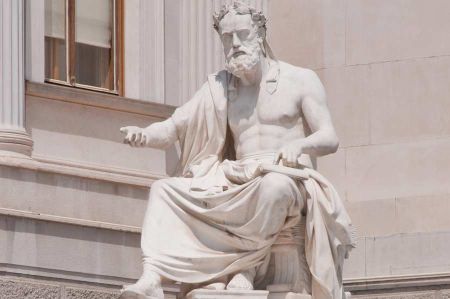Xenophon - philosopher and writer in ancient Athens
Xenophon's birth date is uncertain, but most scholars agree that he was born around 431 BC near the city of Athens. Xenophon was born into the ranks of the upper classes, thus granting him access to certain privileges of the aristocracy of ancient Attica.
While a young man, Xenophon participated in the expedition led by Cyrus the Younger against his older brother, the emperor Artaxerxes II of Persia, in 401 BC.
Xenophon writes that he had asked the veteran Socrates for advice on whether to go with Cyrus, and that Socrates referred him to the divinely inspired Delphic oracle. Xenophon's query to the oracle, however, was not whether or not to accept Cyrus' invitation, but "to which of the gods he must pray and do sacrifice, so that he might best accomplish his intended journey and return in safety, with good fortune." The oracle answered his question and told him to which gods to pray and sacrifice. When Xenophon returned to Athens and told Socrates of the oracle's advice, Socrates chastised him.
Under the pretext of fighting Tissaphernes, Cyrus assembled a massive army composed of native Persian soldiers, but also a large number of Greeks. Prior to waging war against the emperor, Cyrus proposed that the enemy was the Pisidians, and so the Greeks were unaware that they were to battle against the larger army of King Artaxerxes II. At Tarsus the soldiers became aware of Cyrus' plans to dispose of the king, and as a result refused to continue. Clearchus, however, convinced the Greeks to continue with the expedition. The army of Cyrus met the army of Artaxerxes II in the Battle of Cunaxa. Despite effective fighting by the Greeks, Cyrus was killed in the battle. Shortly thereafter, the Greek general Clearchus of Sparta was invited to a peace conference, where, alongside four other generals and many captains, he was betrayed and executed. The mercenaries, known as the Ten Thousand, found themselves without leadership far from the sea, deep in hostile territory near the heart of Mesopotamia. They elected new leaders, including Xenophon himself, and fought their way north through hostile Persiansand Medes to Trapezus on the coast of the Black Sea. They then made their way westward back to Greece. Once there, they helped Seuthes II make himself king of Thrace, before being recruited into the army of the Spartan general Thibron.
Xenophon's book Anabasis ("The Expedition" or "The March Up Country") is his record of the entire expedition against the Persians and the journey home. It is worth noting that the Anabasis was used as a field guide by Alexander the Great during the early phases of his expedition into Persia.
Xenophon was later exiled from Athens, most likely because he fought under the Spartan king Agesilaus II against Athens at Coronea. (However, there may have been contributory causes, such as his support for Socrates, as well as the fact that he had taken service with the Persians.) The Spartans gave him property at Scillus, near Olympia in Elis, where he composed the Anabasis. However, because his son Gryllus fought and died for Athens at the Battle of Mantinea while Xenophon was still alive, Xenophon's banishment may have been revoked. Xenophon died in either Corinth or Athens. His date of death is uncertain; historians only know that he survived his patron Agesilaus II, for whom he wrote an encomium. Xenophon had a fond love of Athens but didn't believe in its political morals, which leads some to believe that he was an oligarch.
Please read as well:
